|
Home
|
History |
Formula
One History
Ayrton Senna's machines
(1) Toward the champion
1983-1988
with technical view |
|
May.1,2003 |
May 1st is the anniversary of
Senna's death. In order to look back upon Senna which played an active
part from the 1980s to the first half of the 1990s, F1 machine by which he
rode is introduced. In the first half, even the place up which he ran from
a test run of F3 time to a debut, first win, and the first champion is
seen. And on each year, it was written the technical view, described what
was the reason and how to try.
|
5月1日はセナの命日。1980年代から1990年代前半にかけて活躍したセナを振り返るため、彼が乗ったF1マシンを紹介していく。前半ではF3時代のテスト走行から、デビュー、初優勝、初王座まで駆け上がったところを見ていく。また、各年に技術的観点を記載し、どのような理由で何を試したかを示す。
|
| |
1983
(23 years old) |
| The
bit of the talent |
才能の片鱗 |
|
Test drive |
| Williams
FW08C Ford |
| Designed
by P.Head |
Engine:
Ford DFV V8 (510bhp) |
Tire:
Goodyear |
In
July, 1983, Senna was fighting F3, in Donington England, he was able to
give the opportunity to ride on F1 machine from Williams. Senna recorded
the time quicker than Palmer of a Williams test driver for 1 second. Frank
Williams told. "Probably it was a mistake that what did not make a
contract of anything with Senna at this time."
|
1983年7月、英ドニントンにて、当時F3を戦っていたセナは、ウィリアムズからF1マシンに乗る機会を与えられた。セナは、ウィリアムズのテストドライバーだったパーマーより1秒速いタイムを記録した。フランク・ウィリアムズは語った。「このとき何が何でもセナと契約しなかったのは、おそらく間違いだったよ。」
|
 |
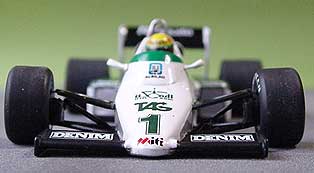 |
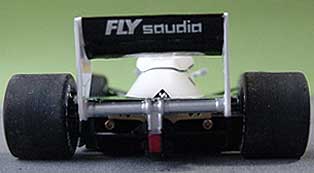 |
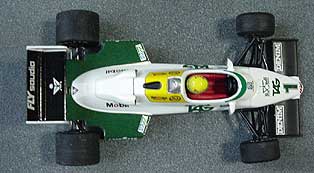 |
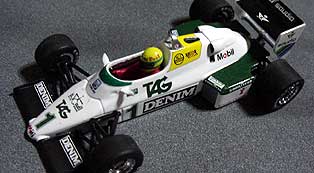 |
Technical
view: This year, the wing car were forbidden and flat bottom
regulation started. The downforce tended to decrease to 1/3, and each team
tended to enlarge the front wing and the rear wing. The motion which makes
side pod small was also seen and Williams rode on it. Moreover, winning,
unless it had the turboengine became impossible. Williams carried Honda
engine in the final race of this year.
|
技術的観点: この年、ウィングカーが禁止され、フラットボトム規制が始まった。ダウンフォースは3分の1に減り、各チームともフロントウィングとリアウィングを大きくしようとした。サイドポッドを小さくする動きも見られ、ウィリアムズはそれに乗った。また、ターボエンジンを持たないと勝てなくなった。ウィリアムズはこの年の最終戦にホンダエンジンを搭載した。
|
| |
1984
(24 years old) |
| A
star is born |
スター誕生 |
Championship:
9th (13 points)
GP: 15, Best: 2nd at Monaco
DNF: 8, DNQ: 1 |
Teammate:
J.Cecotto, S.Johansson
Qualify: Senna 9 won, 2 lost |
Toleman
TG183B Hart
(Round 1-4) |
| Designed
by R.Byrne and J.Gently |
Engine:
Hart S4 Turbo (600bhp) |
Tire:
Pirelli |
British
F3 champion Senna achieved the F1 debut from Toleman, one of medium teams
in March, 1984. The team played with the previous year type from opening 4
races. Senna got a point twice with the qualifying highest grade of No.13
by this 4 races. The 4th race San Marino GP, he had a problem of tire
supply and misfire, and did not qualify whole life only one time.
|
英F3チャンピオンになったセナは、1984年3月、中堅チームのトールマンからF1デビューを果たした。チームは開幕から4戦を前年型で戦った。セナはこの4戦で予選最高位13番手ながら、2度6位入賞した。第4戦サンマリノGPはタイヤ供給の問題やミスファイアなどで、生涯唯一の予選落ちを喫した。ロリー・バーン共同設計。
|
 |
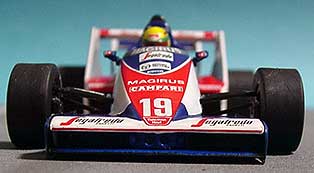 |
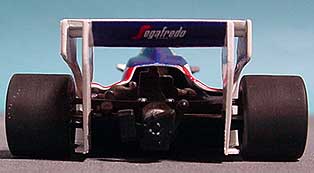 |
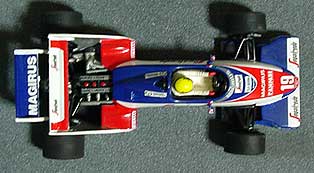 |
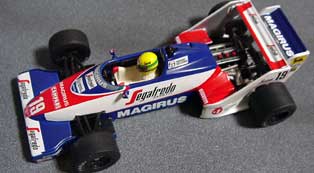 |
| |
Toleman
TG184 Hart
(Round 5-16) |
| Designed
by R.Byrne and J.Gently |
Engine:
Hart S4 Turbo (600bhp) |
Tire:
Pirelli, Michelin |
The
new car appeared from the 5th race. And 6th race Monaco GP had come. Senna
who qualified No.13 passed the preceding car which flinched in rain one
after another, and surfaced to the 2nd place. It was able to pass the 1st
place Prost if there were 1 or 2 laps, the steward stopped the race by red
flag. It still became the race which made existence of Senna know. He
became the qualifying top's 10 companion during second half of the year,
and went up also to the podium by 2 more times.
|
第5戦から新車が登場。そして迎えた第6戦モナコGP。予選13番手のセナは、雨の中ひるむ前車を次々に抜き去り、2位に浮上した。あと1周か2周あれば1位プロストを追い抜けるというところで、競技長が赤旗終了としてしまった。それでも、セナの存在を知らしめたレースになった。後半戦には予選トップ10の常連になり、表彰台にもさらに2度上がった。
|
 |
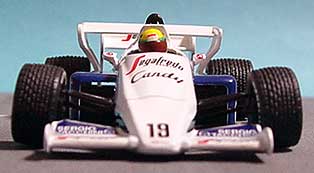 |
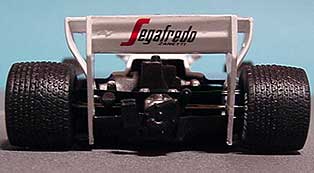 |
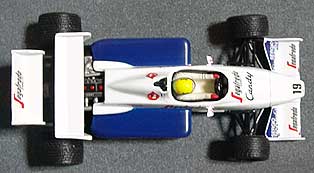 |
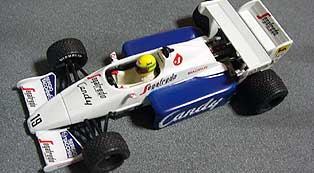 |
Technical
view: Young Rory Byrne differed from others in this team. It was
having attached the 2nd huge rear wing as it is understood, even if it
looks at a car. It was going to regain the downforce lost. Although a few
teams imitated this, there was the fault to which resistance becomes large
and it went out of use. The mainstream was John Barnard of McLaren. Under
the flat bottom, air was passed quickly and discharged with sufficient
vigor by diffuser. It was the point which acquires downforce, without this
increasing resistance.
|
技術的観点: 若き日のロリー・バーンは、このチームで他と違うことをやった。それは車を見てもわかるとおり、巨大な2つ目のリアウィングをつけたことだ。これによって失われたダウンフォースを取り戻そうとした。これは数チームが真似たが、抵抗が大きくなる欠点があり、すたれていった。主流はマクラーレンのジョン・バーナードだった。フラットボトム下で空気を速く流し、ディフューザーで勢い良く排出したのである。これが抵抗を増やさずにダウンフォースを得るポイントだった。
|
| |
1985
(25 years old) |
| Maiden
victory in the rain |
雨の中、初優勝 |
Championship:
4th (38 points)
GP: 16, Best: 1st at Portugal and Belgium
DNF: 7 |
Teammate:
E.de Angelis
Qualify: Senna 13 won, 3 lost |
| Lotus
97T Renault |
| Designed
by G.Ducarouge |
Engine:
Renault V6 Turbo (810bhp) |
Tire:
Goodyear |
Senna
transferred to a top team Lotus, in 2nd year. At 2nd race Portugal GP, he
took 1st PP, and got maiden win in the rain. Senna recorded the most
numerous 7PPs for this year, and impressed the quickest man. 2 odds were
raised in Belgium of the second half of the season. Although a teammate
Angelis had been the 3rd place of a championship in the previous year, he
grow dim beheind activity of Senna.
|
2年目はトップチームのロータスに移籍した。セナは第2戦ポルトガルGPで初PPを奪い、雨の決勝で初優勝した。この年、セナは最多の7PPを記録し、最も速い男を印象付けた。後半のベルギーで2勝目を上げた。チームメイトのアンジェリスは、前年に選手権3位だったが、セナの活躍の前にかすんでしまった。
|
 |
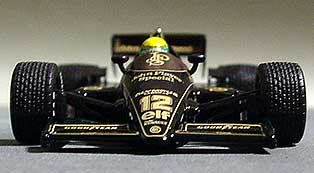 |
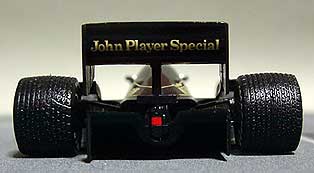 |
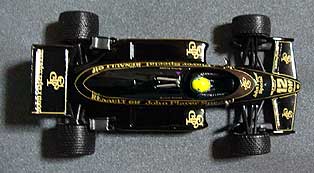 |
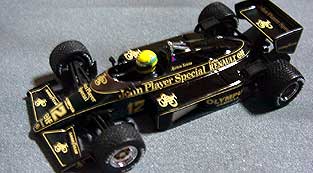 |
Technical
view: The old generation
Ducarouge followed the trend. The cork bottle line and diffuser were
imitated to McLaren, and the wing let was imitated to Ferrari. This was
loaded with Renault engine and activity about the 3rd place of
constructors was completed. Lotus was held again which fell after
Chapman's death. But, it was not the degree which aimed to the champion.
|
技術的観点: 古い世代のドゥカルージュはトレンドを後追いした。マクラーレンのコークボトルラインとディフューザーを真似、フェラーリのウィングレットを真似た。これにルノーエンジンを積んでコンストラクターズ3位くらいの活躍はできた。チャップマンの死後、落ち込んだロータスを持ち直した。だが、王座を狙うほどではなかった。
|
| |
1986
(26 years old) |
| Two
year continuation most PP |
2年連続最多PP |
Championship:
4th (55 points)
GP: 16, Best: 1st at Spain and USA
DNF: 6 |
Teammate:
J.Dumflies
Qualify: Senna 16 won, 0 lost |
| Lotus
98T Renault |
| Designed
by G.Ducarouge |
Engine:
Renault V6 Turbo (900bhp) |
Tire:
Goodyear |
The
2nd year in Lotus, the score increased by 17 points. Number of PPs was 8
times, it was two year continuation the most numerous PPs. It showed Senna
was the quickest. But two victories and the 4th place of the championship
were the same as that of the previous year. Renault engine was strong in
the qualifying, but on the race, he could not match Honda or TAG Porsche.
Senna desired acquisition of Honda engine.
|
ロータスでの2年目は、得点が17点増えた。PPは8回獲り、2年連続で最多PPとなった。セナが速さでは抜きん出ていることを示した。だが勝利2回、選手権4位は前年と同じだった。ルノーエンジンは予選に強いが、レースになるとホンダやTAGポルシェにかなわなかった。セナはホンダエンジンの獲得を熱望した。
|
 |
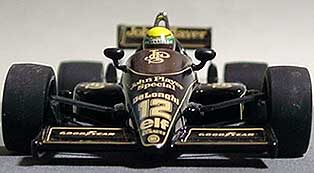 |
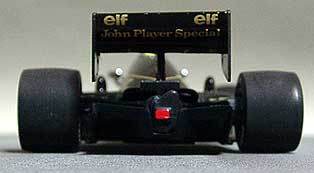 |
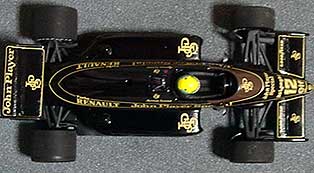 |
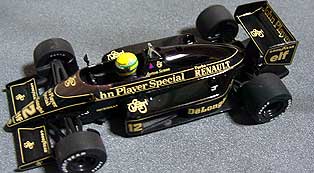 |
Technical
view: It did not change so
as a lot as the previous year, but refined. The front wing was made into
the rectangle. The turbo duct was attached on side pod, and wing let was
abolished. The rear wing was made a little small and diffuser lost the
side end.
|
技術的観点: 前年とそれほど大きく変えず、リファインした。フロントウィングは長方形にした。サイドポッド上にターボダクトをつけ、ウィングレットは廃止した。リアウィングはやや小さくし、ディフューザーはサイドエンドをなくした。
|
| |
1987
(27 years old) |
| Cooperated
with Honda of the wish |
念願のホンダと組む |
Championship:
3rd (57 points)
GP: 16, Best: 1st at Monaco and USA
DNF: 3, DSQ: 1 |
Teammate:
S.Nakajima
Qualify: Senna 16 won, 0 lost |
| Lotus
99T Honda |
| Designed
by G.Ducarouge |
Engine:
Honda V6 Turbo (850bhp) |
Tire:
Goodyear |
The
year constructed with Honda of the wish for the first time. Lotus carried
the active suspension and two victories (Monaco, Detroit) of Senna were
carried out in the public road race. But in a high-speed circuit, it could
not deny that a chassis was inferior and he was not able to follow
Williams Honda. He took PP only 1 time of San Marino. On the other hand,
growth having been seen was that there was only three retired.
|
念願のホンダと初めて組んだ年。ロータスはアクティブ・サスペンションを搭載し、セナは公道レースで2勝(モナコ、デトロイト)した。だが高速サーキットではシャシーの劣勢が否めず、ウィリアムズ・ホンダについていけなかった。PPはわずかにサンマリノの1回にとどまった。一方、成長が見られたのは、リタイヤが3回しかなかったことだ。
|
 |
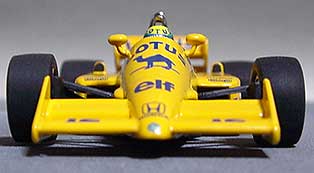 |
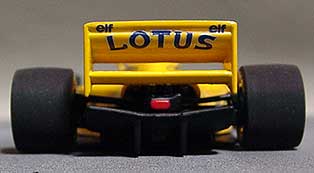 |
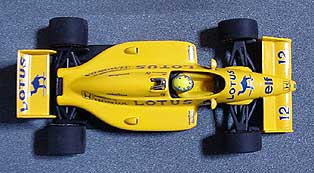 |
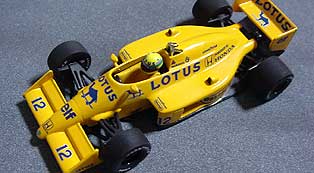 |
Technical
view: The try of an
active suspension was advanced. But it remained in the region of trial and
error. Although Ducarouge
thought that it could win with the chassis of the previous year
fundamentally when putting Honda engine, it was mistaken prospect. Lotus
had been the thickset although, as for the rival, slimming of the body was
progressing. Since it had large air resistance, the maximum speed was
stopped and mpg was also bad. The rear wing became two sheets used as
subsequent foundations. Turbo pressure was regulated by 4 bars by the
pop-off valve, and 50H.P. fell from the previous year.
|
技術的観点: アクティブ・サスペンションへのトライは先進的だったが、試行錯誤の域にとどまった。ドゥカルージュは、ホンダエンジンを乗せれば基本的に前年のシャシーで勝てると思ったが、そう甘くはなかった。ライバルは車体のスリム化が進んでいたが、ロータスはずんぐりしたままだった。それは空気抵抗が大きいため、最高速が抑えられ、かつ燃費も悪かった。リアウィングはその後の基本となる2枚になっている。ターボ圧はポップオフバルブで4バールに規制され、前年より50馬力は落ちた。
|
| |
1988
(28 years old) |
| Champion
for the first time |
初めての王座につく |
Championship:
1st (90 points)
GP: 16, Best: 1st at SanMarino, Canada, Detoloit, Britain,
Germany,Hungaly, Belgium, and Japan
DNF: 2 |
Teammate:
A.Prost
Qualify: Senna 14 won, 2 lost |
| McLaren
MP4/4 Honda |
| Designed
by S.Nichols |
Engine:
Honda V6 Turbo (650bhp) |
Tire:
Goodyear |
Senna
transferred to the McLaren and faced by the strongest members with Honda
and Prost. Machines won 15 of 16 races. Although Senna recorded PP 13
times, in the race, Prost held on obstinately. At the 15th race Japan GP,
although Senna failed in the start, he caught up with, overtook Prost, and
won. And he shone with the first throne. The dream of Senna was attained.
|
マクラーレンに移籍し、ホンダ、プロストとともに最強の布陣で臨んだ。マシンは16戦15勝と無敵だった。セナはPPを13回も記録するが、レースではプロストが執拗に食い下がった。第15戦日本GPで、セナはスタートに失敗するも、追い上げてプロストを抜き去り、勝った。そして初めての王座に輝いた。セナの夢が達成された。
|
 |
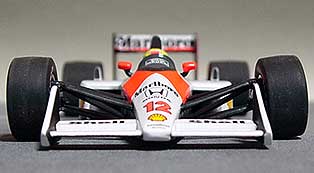 |
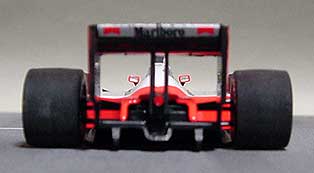 |
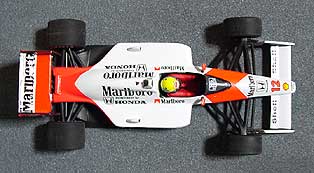 |
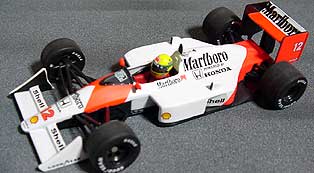 |
Technical
view: On the basis of the
concept taken over to Nichols from Bernard, low center-of-gravity-ization
progressed and the body also became tight thinly. It became the forerunner
of how that the McLaren functioned not as expert workmanship but as an
organization. It also became the strong point to feed back the data of
telemetry to machine development. The mpg of Honda was most excellent in
the year of the turbo last under the condition on which fuel was regulated
by 150l. Turbo pressure was regulated by 2.5 bars, and although a
horsepower fell further, it maintained predominance to non turbo vigor.
|
技術的観点: バーナードからニコルスに引き継がれたコンセプトを基本に、低重心化が進み、ボディも細く引き締まった。マクラーレンが職人芸でなく組織として機能したことが、現代のチームのありかたの先駆けとなった。テレメトリのデータをマシン開発にフィードバックすることも強みとなった。ターボ最後の年に、燃料が150リットルに規制された条件下で、ホンダの燃費が最も優れていた。ターボ圧が2.5バールに規制され、馬力はさらに落ちたがノンターボ勢に対しては優位を保った。
|
|
To be continued... |
Formula
One History
Ayrton Senna's machines
(1) Toward the champion
1983-1988
with technical view |
|
Home
|
History |


































